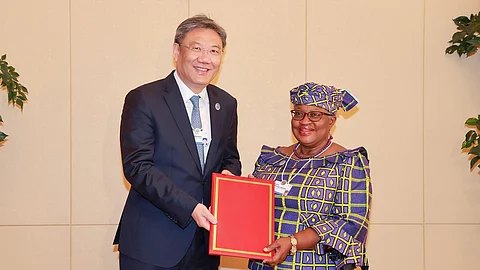

China has become the latest signatory to the World Trade Organization (WTO) Agreement on Fisheries Subsidies, only the second agreement reached by the WTO since its inception.
According to the WTO, the agreement marks a "major step forward for ocean sustainability" by prohibiting harmful fisheries subsidies, which are widely considered a critical factor in the depletion of fish stocks worldwide.
The Agreement prohibits countries from supporting illegal, unreported and unregulated (IUU) fishing, bans support for fishing overfished stocks, and also ends subsidies for fishing on the high seas, the unregulated international waters which have also recently received protection from the UN's High Seas treaty.
China is the latest country to sign up to the protocol, and is arguably also the most important signatory, as the dominant global player in marine capture fisheries, accounting for almost 15 percent of global captures in 2020, according to FAO figures.
However, in order for the agreement to come into force, formal acceptances are needed from two-thirds of all 164 WTO members.
Thus far, the agreement has secured 11 signatories, including the European Union, which formally accepted the agreement at the beginning of June, in addition to the United States, Canada, Iceland, and Nigeria, among others. First to sign was Switzerland, formally accepting in January 2023.
WTO Director General Ngozi Okonjo-Iweala said she was "delighted" to welcome China's formal acceptance of the agreement, saying, "As the world leader in marine fish catch, China's support for the implementation of this agreement is critical to multilateral efforts to safeguard oceans, food security, and livelihoods."
"By curbing harmful fishing subsidies worldwide, we can together forge a path towards a legacy of abundance and opportunity for generations to come," Okonjo-Iweala said.
Presenting China's formal acceptance to the Director General Okonjo-Iweala, Chinese Commerce Commerce Minister Wang Wentao called the agreement "significant" and said it would "boost the confidence of all members in multilateralism."
"China has completed the approval procedure of the agreement and will work with all members to push the agreement to enter into force before the 13th WTO Ministerial Conference. At the same time, China will participate in the second phase of negotiations in a positive and constructive manner and look forward to an early outcome of the negotiations," he added.
According to the WTO, the agreement marks a "historic achievement", representing the first UN Sustainable Development Goal (SDG) target to be fully met, and also the first achieved through multilateral agreement. The agreement on fisheries is also the first WTO agreement focusing on the environment, and is only the second agreement reached at the WTO since its inception.
Adopted by consensus at the WTO's 12th Ministerial Conference (MC12) held in Geneva on 12-17 June 2022, the Agreement on Fisheries Subsidies sets new binding, multilateral rules to curb harmful subsidies. The Agreement also recognizes the needs of developing and least-developed countries (LDCs), and will establish a fund to provide technical assistance and capacity building to help them implement the obligations.
The 13th WTO ministerial conference will be held in Abu Dhabi, United Arab Emirates, in February 2024.
Countries who have formally accepted the Agreement thus far are, in order of acceptance date: Switzerland, Singapore, Seychelles, United States, Canada, Iceland, United Arab Emirates, European Union, Nigeria, Belize, and China.
